| Srl | Item |
| 1 |
ID:
101065
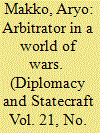

|
|
|
|
|
| Publication |
2010.
|
| Summary/Abstract |
The League of Nations is primarily remembered for its failures in the 1930s. Indeed, the established perception of its history usually emphasizes weaknesses. Failing to settle the question of which Power should possess the former Ottoman province of Mosul after the First World War, Turkey saw the dispute addressed to the League in summer 1924. Within a short time, a multi-leveled negotiation process that involved a large number of politicians, diplomats, and lawyers was put in motion. Sixteen months and many crises later, the League Council awarded the entire Mosul province to Iraq. The arbitration had been based upon data collected by two enquiry commissions comprising representatives from eight different Powers, the work of both numerous mediators, and a Council sub-committee. Though certainly not perfect, the League's role averted war and renewed disaster.
|
|
|
|
|
|
|
|
|
|
|
|
|
|
|
|
| 2 |
ID:
093312
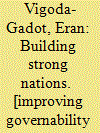

|
|
|
|
|
| Publication |
Surrey, Ashgate, 2009.
|
| Description |
xv, 258p.
|
| Standard Number |
9780754675464
|
|
|
|
|
|
|
|
|
|
|
|
Copies: C:1/I:0,R:0,Q:0
Circulation
| Accession# | Call# | Current Location | Status | Policy | Location |
| 054706 | 351/VIG 054706 | Main | On Shelf | General | |
|
|
|
|
| 3 |
ID:
092004
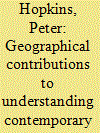

|
|
|
|
|
| Publication |
2009.
|
| Summary/Abstract |
In recent years, geographers have been giving increasing attention to religion- and Islam in particular-yet such work is rarely referred to within the broader social science literature about Islam and Muslims. This paper seeks to promote interdisciplinary dialogue, discussion and debate by highlighting the contributions that human geographers are making to understanding of contemporary Islam. In particular, I draw upon research within urban, social, cultural and feminist geographies to review current trends within geographical scholarship about Muslims individuals and communities. I then use this paper to suggest ways in which interdisciplinary research-in collaboration with human geographers-might seek to advance contemporary understanding of the social and spatial experences of Muslim families and communities.
|
|
|
|
|
|
|
|
|
|
|
|
|
|
|
|
| 4 |
ID:
108939
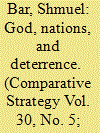

|
|
|
|
|
| Publication |
2011.
|
| Summary/Abstract |
This article discusses the influence of religion on deterrence. Faith may increase risk propensity and lower the legitimacy of being deterred. Anticipation of divine intervention, reward or punishment, adherence to an apocalyptic ideology, or (in the Shiite world) to believe in the imminent advent of the Hidden Imam reduces susceptibility to deterrent threats. Religious motivation can, however, be potentially exploited to enhance deterrence. Superstitions can induce courage and self sacrifice but may also induce fear and mass hysteria. Prophecies too are a two-edged sword; believers, who receive divine guarantees that a certain event will not happen, may lose faith in the face of the occurrence of that event.
|
|
|
|
|
|
|
|
|
|
|
|
|
|
|
|
| 5 |
ID:
120013
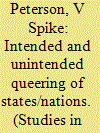

|
|
|
| 6 |
ID:
093198
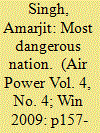

|
|
|
| 7 |
ID:
086963
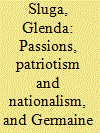

|
|
|
|
|
| Publication |
2009.
|
| Summary/Abstract |
This essay examines the influence of sentimentalism on conceptions of patriotism at the turn of the nineteenth century in order to historicise conventional views of the nature of patriotism as a fundamental human emotion. It uses a focus on the intellectual thought of Germaine de Staël in order to understand how a 'sentimental' view of patriotism took hold at a crucial moment in the European history of the idea of the nation and of the conceptualisation of emotions. I argue that de Staël's ideas and influence lead us to a radical reconsideration of the significance of the emotional history of patriotism for how we explain nationalism.
|
|
|
|
|
|
|
|
|
|
|
|
|
|
|
|
| 8 |
ID:
088070
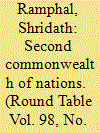

|
|
|
| 9 |
ID:
147911
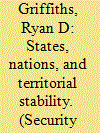

|
|
|
|
|
| Summary/Abstract |
How would a hegemonic China shape international norms related to states, nations, and territoriality? Scholars have noted the conflict between the right of minority nations to self-determine and the right of states to maintain their territorial integrity. An unrestricted application of the former would risk considerable state fragmentation; an unconditional acceptance of the latter would condemn stateless nations to a subordinate status. Powerful actors like the United States have attempted to navigate these norms by specifying the conditions under which one norm should take precedence over the other, but such decisions are difficult to make in an international environment that lacks consensus, and the result is an ambiguous international order where conflict is common. I analyze the future of these norms in a Chinese-led international order, explaining why China would champion territorial integrity over self-determination, and why this would be better for territorial stability.
|
|
|
|
|
|
|
|
|
|
|
|
|
|
|
|